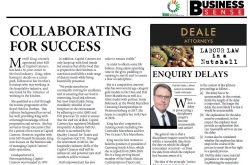Enquiry Delays - Patrick Deale2019-04-22 When does a delay in prosecuting a disciplinary enquiry become unreasonable and unfair?
The general rule is that a disciplinary inquiry must be held within a reasonable time from the date on which the alleged misconduct occurred â€" or from the date from which the employer first became aware of it. The idea of the principle ‘justice delayed is justice denied’ is that an unreasonable delay can cause serious prejudice for the employee concerned. It could also lead to the conclusion that the employer has abandoned its right to take disciplinary action against the employee. The Constitutional Court considered the issue of delay in a case 1 decided in February 2019. It involved an appeal against a dismissal lodged in August 2011 which was decided only in February 2014. The employee argued that the employer had abandoned its right to discipline the applicant on account of the unexplained and lengthy delay. The Con-Court said the delay itself does not constitute unfairness but the length of the delay must be considered in context. It referred to a judgment by Justice Sachs in which he saidâ€" “The delay in the present matter must be evaluated not as the foundation of a right to be tried without unreasonable delay, but as an element in determining whether, in all the circumstances, the delay would inevitably and irredeemably taint the overall substantive fairness of the trial if it were to commence.†The question whether a delay in finalisation of disciplinary proceedings is unacceptable is a matter that can be determined on a case-by-case basis. There can be no hard and fast rules. The Con-Court outlined the factors in Sanderson 2 to determine what constituted an unreasonable and unfair delay in the context of disciplinary proceedings as follows â€" [a] The delay has to be unreasonable. In this context, firstly the length of the delay is important. The longer the delay, the more likely it is that it would be unreasonable. [b] The explanation for the delay must be considered. In this respect the employer must provide an explanation that can reasonably serve to excuse the delay. [c] It must also be considered whether the employee has taken steps in the course of the process to assert his or her right to a speedy process. [d] Did the delay cause material prejudice to the employee? Establishing the materiality of the prejudice includes an assessment as to what impact the delay has on the ability of the employee to conduct a proper case. [e] The nature of the alleged fenced must be taken into account. The offense may be such that there is a particular imperative to have a decision on the merits. This does not mean that a very serious offense (such as a dishonesty) must be dealt with, no matter what, just because it is so serious. [f] All the above considerations must be applied, not individually, but holistically. TIP: Employers should ensure that a disciplinary enquiry is conducted as speedily as possible to avoid accusations of prejudice by the employee. The delays often occur after the employee has been suspended and while the employer conducts an investigation. Some investigations can take a long time and be explainable where complex issues are involved. The employer should communicate with the employee to keep him or her informed. This reduces speculation about the employer’s motives and accusations of unreasonable delay in proceeding with the enquiry. ï®ï€ 1 Stokwe v MEC: Dept of Education, Eastern Cape & Others CCT 33/18 7 Feb 2019 2 Sanderson v Attorney General, Eastern Cape 1998 (2) SA 38 (CC). Offices in KZN and Johannesburg C: 083 375 8771 E: patrick@deale.co.za W: www.deale.co.za Labour Lawyer & Mediator, Deale Attorneys |
Enquiry Delays - Patrick Deale
Copyright © 2026 KwaZulu-Natal Top Business
